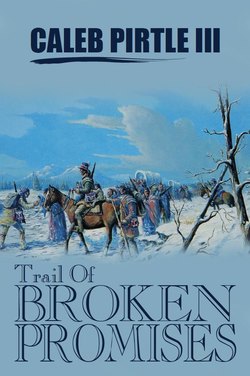Читать книгу Trail of Broken Promises - Caleb Pirtle III - Страница 8
На сайте Литреса книга снята с продажи.
Chapter 4: Hunters of the Southern Woodlands
ОглавлениеTHE CHOCTAWS, their story tellers told them, came from the west, marching behind priests who carried the sacred book wrapped in animal skins. They sang in unknown tongues and trekked a desolate land, meeting no one and nothing until a terrible sickness gripped them.
The priests died, all but one, all but the bearer of the sacred book.
The Choctaws burned their dead but kept the ashes, then trudged on, coming at last to Nane-wy-yah, the stooping hill. They all lay down to die, all but one, the bearer to the sacred book.
The Nane-wy-yah opened up, and the last priest entered, then vanished.
The years swept past, and finally the Great Spirit took the ashes of the dead and, from them, created two boys and two girls. They were suckled by a panther until they grew strong and tall and were ready to leave.
The bearer of the sacred book appeared to them, giving them bows and arrows and an earthen pot. He stretched his arms and said, “I give you these hunting grounds for your home. When you leave them, you die.”
The Choctaws had no thoughts of ever leaving them. They were quite pleased with the Mississippi and Alabama dirt beneath their feet. The soil was rich and fertile, so they spent their days clearing fields, plowing with a bent stick or a piece of flint or maybe the shoulder bone of the bison, and growing beans, corn, pumpkins, and melons. They raised enough to satisfy their own needs, then peddled the rest to neighboring tribes who had more land but less success with the art and patience of farming.
Buffalo grazed the grasslands, Wild turkey and deer hid away in the forests. Squirrels chattered from treetops, and the beaver bridged the rivers. The Choctaw became a hunter without equal, moving quietly through the woodlands and canebrakes with a blowgun, a bow and arrow, and later a rifle, which gave him dominion over all the beasts of the field, including man.
A missionary, H. B. Cushman, wrote:
The Choctaw hunter generally hunted alone and on foot; and when he killed his game, unless small, he left it where it had fallen, and turning his footsteps homeward, traveled in a straight line, here and there breaking a twig leaving its top in the direction he had come, as a guide to his wife . . . As soon as he arrived, he informed her of his success and merely pointed in the direction in which the game lay. At once she mounted a pony and started in the direction indicated; and guided by the broken twigs, she soon arrived at the spot, picked up and fastened the dead animal to the saddle, mounted and soon went home again; then soon dressed and prepared a portion for her hunter lord’s meal, while he sat and smoked his pipe in meditative silence. No animal adapted for food was ever killed in wanton sport by an Indian hunter.
The Choctaws seldom sought war.
They never ran from it.
In fact, Bernard Romans, who traveled among them in 1770, wrote:
They are the swiftest of foot of any savages in America, and very expert in tracking a flying enemy, who very seldom escapes. . . They almost always brought [their captives] home to shew them, and then dispatched them with a bullet or hatchet; after which the body being cut into many parts, and all the hairy pieces of skin converted into scalps, the remainder is buried, and the above trophies carried home, where the women dance with them till tired.
The women had every right to dance.
The women – at least some of the – were quick to march into the specter of war right along with their husbands. As the Frenchman, Bossu, witnessed, “They keep by their sides in combat holding a quiver of arrows and encourage them by crying out continually that they must not fear their enemies but die like true men.”
Many battlefield women trudged home as battlefield widows. All they had left was his medicine bag, the one filled with the ashes of bird bones and weeds, the one he carried to protect him in time of war and dying.
The dead, wrapped in skins and bark, were laid upon a platform, along with food and drink, a change of clothes, and the body of a dog killed specifically to provide the deceased with a companion on his cold journey into the night. A fire burned to keep them warm.
Months later, the bone picker – the honored one – came to tear away the rotting flesh with long fingernails, to scrape the bones and leave them clean for burial, to silence the singing and the howling of the bereaved.
The Choctaws practiced strange customs. They flattened the heads of their infants, from crown to eyebrows, with small bags of sand. The early explorers described them as hideous. For jewelry, the women wore strings of dyed chinquapin nuts and, sometimes winter berries and, sometimes seeds of the red haw.
A mother-in-law was forbidden to look upon the husband of her daughter, so she walked, without complaint, with her eyes forever cast upon the ground. A woman could not speak the name of her husband, and all Choctaws were hesitant to even utter their own names aloud, and most never did.
So the white men were suspicious of them. And they called the Choctaw savage.
